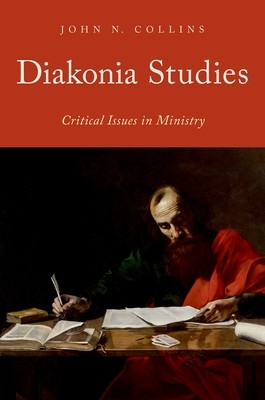
- We will send in 10–14 business days.
- Author: John N Collins
- Publisher: Oxford University Press, USA
- ISBN-10: 0199367574
- ISBN-13: 9780199367573
- Format: 3.8 x 24.1 x 2.8 cm, kieti viršeliai
- Language: English
- SAVE -10% with code: EXTRA
Reviews
Description
Diakonia Studies closes the account on John N. Collins's 40 years of involvement in groundbreaking linguistic research and argumentation concerning the nature and functioning of Christian ministry. Dispute has swirled around the Greek term diakonia for 50 years. Once seen as enshrining the New Testament value of loving Christian service-what Jerome Murphy-O'Connor called "one of the dogmas of New Testament scholarship"-the word was exposed by Dieter Georgi in 1964 as arguably meaning something quite different. In 1974 John N. Collins published his first paper on the issue, pointing to inadequacies in Georgi's brief account. Then in 1990 Collins published his exhaustive semantic survey, Diakonia: Re-interpreting the Ancient Sources. His re-interpretation was variously hailed as "devastating," "provocative," "unfashionable," and "a scholarly avalanche whose conclusions are inescapable." Since then, the book has stood at the center of "the Collins-Debate." Meanwhile Collins's findings have been incorporated in the authoritative Danker Greek-English Lexicon of the New Testament.Diakonia Studies examines, in a non-technical way (i.e., without appeal to particulars of Greek), the reasons why theologians need not only to review cherished readings of leading New Testament passages but also to reassess what some passages might really be saying about the nature and delivery of ministry. These third-millennium issues are the matter of the final papers in the volume, reminding churches of the ministry they have received and of their filed-away commitments to an ecumenically-charged ministry. Among the topics considered are ordained and lay ministries, the tension between office and charism, and prospects for deacons when a diakonia of loving service no longer defines their call.
EXTRA 10 % discount with code: EXTRA
The promotion ends in 21d.10:16:08
The discount code is valid when purchasing from 10 €. Discounts do not stack.
- Author: John N Collins
- Publisher: Oxford University Press, USA
- ISBN-10: 0199367574
- ISBN-13: 9780199367573
- Format: 3.8 x 24.1 x 2.8 cm, kieti viršeliai
- Language: English English
Diakonia Studies examines, in a non-technical way (i.e., without appeal to particulars of Greek), the reasons why theologians need not only to review cherished readings of leading New Testament passages but also to reassess what some passages might really be saying about the nature and delivery of ministry. These third-millennium issues are the matter of the final papers in the volume, reminding churches of the ministry they have received and of their filed-away commitments to an ecumenically-charged ministry. Among the topics considered are ordained and lay ministries, the tension between office and charism, and prospects for deacons when a diakonia of loving service no longer defines their call.


Reviews